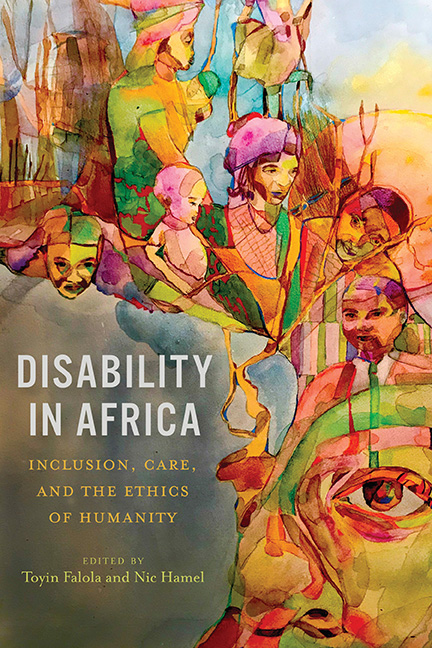Book contents
- Frontmatter
- Dedication
- Contents
- Part One Introducing the Field
- Part Two Theorizing Disability in Africa
- Part Three Representation and Cultural Expressions
- Part Four Education, Community, and Caregiving
- Part Five Activism and Barriers to Inclusion
- Conclusion: A Research Agenda for African Disability Studies
- Selected Bibliography
- Notes on Contributors
- Index
5 - Disability in Africa: A Cultural/Religious Perspective
Published online by Cambridge University Press: 17 June 2021
- Frontmatter
- Dedication
- Contents
- Part One Introducing the Field
- Part Two Theorizing Disability in Africa
- Part Three Representation and Cultural Expressions
- Part Four Education, Community, and Caregiving
- Part Five Activism and Barriers to Inclusion
- Conclusion: A Research Agenda for African Disability Studies
- Selected Bibliography
- Notes on Contributors
- Index
Summary
Introduction
Disability is part of the human condition, and most human beings are likely to experience disablement at some point in their lives. Those with disabilities represent a significant proportion of the world's population. According to the World Report on Disability, more than a billion people worldwide experience some form of disability. This is about 15 percent of the world's population. About 80 percent of them live in developing countries, while 20 percent of those reside in the poorest of these countries. According to WHO, about 40 percent of Africa's population live with disabilities: that is, more than half a billion people. Of these, about 15 percent are school-age children. The central questions explored in this study are (1) Why is disability considered a problem in many societies in Africa? (2) What is the origin or justification of perceptions and behavior toward people with disabilities? (3) What are the moral implications of attitudes and behavior toward those with disabilities? It is argued that perceptions about disability are complex, influenced as they are by sociocultural and biomedical factors.
On November 20, 1975, around 10 a.m., Idi Amin, then dictator and president of Uganda, drove into Kampala's main car park. He was accompanied by some of his ministers and bodyguards. He got out of his car and found a group of men playing ajua, a locally popular game. Amin asked to join the game, and one of the players gave up his position for the president. It was soon apparent that Amin was good at ajua. He was cheered by the crowd as he beat one man after another. As the word got around that the president was playing ajua, the crowd grew. In the middle of these scenes of jubilation, there came a crippled man by the name of Wandera Maksini. Wandera, who was quite popular in Kampala, pushed his way through the crowd with his crutches and collapsed in front of Amin. He glared at Amin and started insulting him. He called the president names and told him that he should not have banished Asians from Uganda because the “common man” was now suffering. “We don't have commodities in the shops, yet you call yourself president, son of a bitch! Kill me if you want—” Wandera dared the president.
- Type
- Chapter
- Information
- Disability in AfricaInclusion, Care, and the Ethics of Humanity, pp. 115 - 136Publisher: Boydell & BrewerPrint publication year: 2021
- 1
- Cited by



